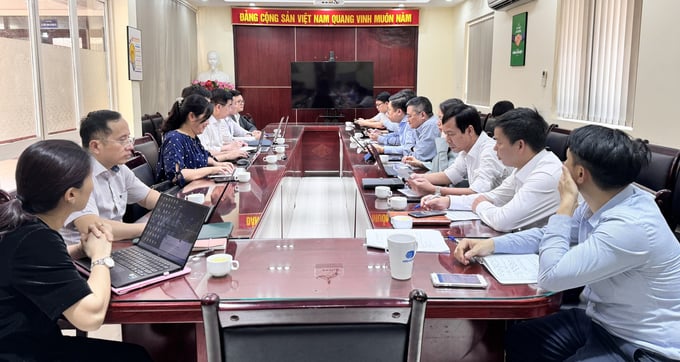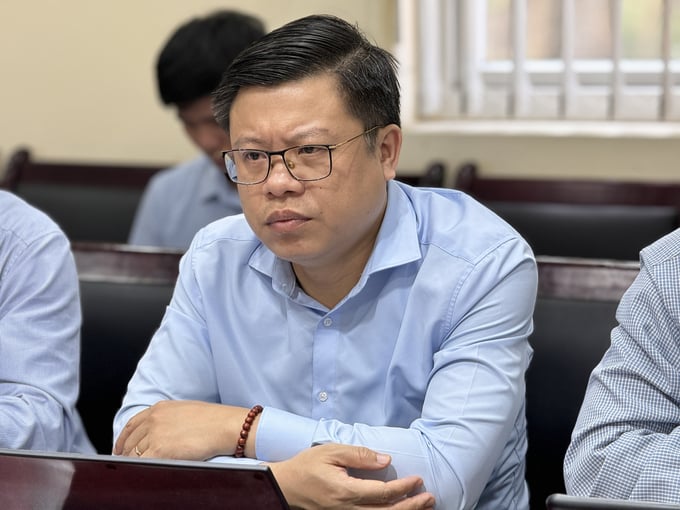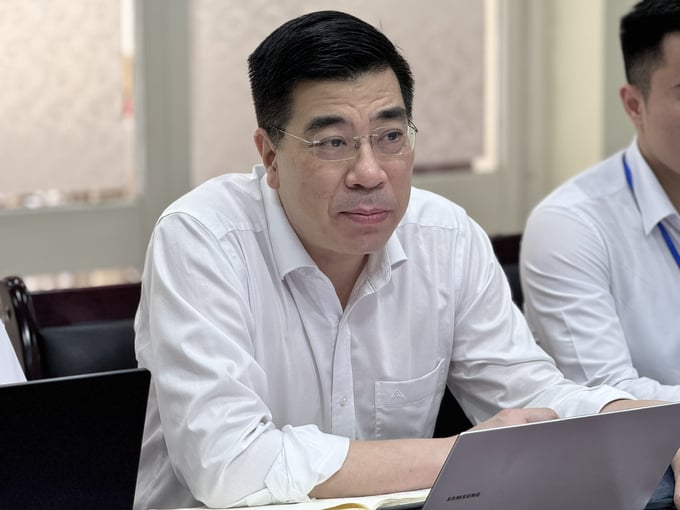May 26, 2025 | 01:38 GMT +7
May 26, 2025 | 01:38 GMT +7
Hotline: 0913.378.918
May 26, 2025 | 01:38 GMT +7
Hotline: 0913.378.918
Representatives from the Ministry of Agriculture and Rural Development and the Ministry of Information and Communications held a meeting on the afternoon of March 25 to discuss a plan to support the integration of agricultural production onto e-commerce platforms, thereby promoting the development of digital agriculture and rural economies. Mr. Nguyen Quoc Toan, General Director of the Center for Agriculture Digital Transformation and Statistics, reported that following the pandemic, transactions on e-commerce platforms have developed rapidly, driven by the active engagement of stakeholders including farmers, e-commerce platforms, cooperatives, and the Ministry of Agriculture and Rural Development.

Representatives from the Ministry of Agriculture and Rural Development and the Ministry of Information and Communications held a meeting on the afternoon of March 25 to discuss a plan to support the integration of agricultural production onto e-commerce platforms, thereby promoting the development of digital agriculture and rural economies.
However, the introduction of agricultural products to e-commerce platforms faces numerous challenges, such as the need for farmers to undergo "professionalization" in terms of business registration, production, trade, production linkage, product training, and activities on e-commerce platforms. Mr. Toan noted that the difficulty lies in the connection between farmers and e-commerce platforms, which is not as effective as the relationship between farmers and cooperatives in placing agricultural products into retail chains due to dependence on inventory management and reasonable discounts for consumers.

Mr. Nguyen Quoc Toan, General Director of the Center for Agriculture Digital Transformation and Statistics, reported that digital commerce has emerged as a superior model following the Covid-19 pandemic.
The Postmart e-commerce platform was established in 2019 with the mission of connecting consumers with agricultural products, and providing support for farmers, business households, and businesses. Postmart specializes in offering high-quality OCOP- and VietGAP-compliant agricultural products, as well as specialties from various regions in Vietnam.
However, according to Mr. Tran Minh Tuan, General Director of the Department of Digital Economy and Digital Society under the Ministry of Information and Communications, Postmart failed to achieve its projected results after two years of operation. Mr. Tuan attributed Postmart's challenges to farmers' lack of familiarity with e-commerce platforms, and reliance on intermediaries.
Consequently, Mr. Tuan proposed the Ministry of Agriculture and Rural Development to establish a strategy to bring fresh agricultural products to e-commerce platforms, encourage farmers and traders to participate in value chains. Namely, he suggested that instead of relying solely on the B2B channel (business-to-business), stakeholders can utilize a B2B2C channel (business-to-business-to-customer), which is a business model involving cooperation between two businesses, selling products or services to end consumers.
He emphasized: "Support from agricultural extension programs and initiatives from the Department of Quality, Processing and Market Development under the Ministry of Agriculture and Rural Development will help us promote the development of the e-commerce platform. Both parties need to maintain a information sharing channel, and send quarterly reports to the National Committee on Digital Transformation, thereby encouraging support from relevant ministries and sectors."
Decision No. 924/QD-TTg, issued by the Prime Minister on August 2, 2022, approved the Program for digital transformation in new rural construction, with the aim of establishing smart rural areas from 2021 to 2025. Accordingly, the Decision has opened up an important development direction, where smart rural areas are identified as areas with electronic connections to consumers.

Mr. Tran Minh Tuan, General Director of the Department of Digital Economy and Digital Society under the Ministry of Information and Communications, stated that agricultural transactions on e-commerce platforms are exhibiting signs of deceleration.
However, the implementation of agricultural trade on e-commerce platform faces significant challenges, with overlapping responsibilities among ministries and sectors. Due to the strict procedures and complex legal requirements of e-commerce platforms, farmers and traders also encounter difficulties in gaining access. As a result, farmers must be enabled to become operators of e-commerce platforms to resolve these challenges
One potential solution is to utilize popular social networks such as TikTok. Transactions on TikTok have the advantage of deep connections between Key Opinion Leaders (KOLs) and audiences, in addition to a developed logistics systems. Notably, rural youth are becoming more dynamic and have easy access to TikTok, thereby providing an opportunity to promote electronic agricultural trade.
Regarding the involvement of third parties to bring farmers' agricultural products to consumers, Mr. Dao Duc Huan, Head of the Managing Department for the One Commune One Product Program under the Central Coordination Office for New Rural Development, believes this is a new approach in response to the current stagnation in agricultural trade on e-commerce platforms.
According to Mr. Huan, the placement of OCOP products on e-commerce platforms has decelerated over the last two years. The maintenance of OCOP products on sales channels faces numerous difficulties due to seasonal factors, barriers to consignment, logistics, and the adaptability of stakeholders to e-commerce, among others.
However, after TikTok Shop cooperated with the Trade Promotion Center for Agriculture to enhance support for small and medium-sized businesses, cooperatives in the digital transformation of trade promotion activities under the "One Commune One Product" Program, agricultural products have been effectively promoted to consumers.
Mr. Huan attributed this success to the advantages of new-style e-commerce platforms such as TikTok Shop, which include optimized interaction between producers and consumers, optimized product search efficiency and consumer reach by utilizing the knowledge of consumers familiar with new digital platforms. Other e-commerce platforms are also currently following this trend. As a result, local farmers should be trained as both producers and as knowledgeable influencers to bring agricultural products closer to consumers.
Mr. Tuan regards local farmers as the "digital sales force," which needs to be fully utilized to open up new directions beyond traditional e-commerce platforms.
Four livestream sessions were hosted by four famous content creators on the TikTok platform in early January 2024, in Long Thoi commune, Cho Lach district. The livestreams were part of the "Southwestern Tet Market" program organized by TikTok Vietnam in collaboration with local governments. The livestreams received a total of 19.5 million views on the platform, generating over 5,000 purchase orders. During the 4-hour livestream, the four content creators sold over 1,500 orders of Tien Giang sausage, 714 orders of ornamental plants to Huyen Linh seedling farm in Cho Lach district, and over 300 orders of dried 'gac bep' meat.
Translated by Nguyen
/2025/05/25/4127-3-073637_820.jpg)
(VAN) Thanks to the promotion from an FAO-implemented project, vegetable production in greenhouses in Moc Chau has seen strong development, from 1.5 hectares in 2021 to nearly 50 hectares in 2024.

(VAN) FAO has recently supported USD 140,000 to implement the project 'Risk mitigation human-animal interface risks through disease control initiatives in pig farming.'

(VAN) The People's Committee of Tra Vinh province has approved an adjustment to the investment policy for the Green Hydrogen Plant project, increasing its area to approximately 52.76 hectares.
![Reducing emissions from rice fields: [2] Farmers’ commitment to the soil](https://t.ex-cdn.com/nongnghiepmoitruong.vn/608w/files/news/2025/05/05/dsc08881jpg-nongnghiep-140632.jpg)
(VAN) Clean rice cultivation model in Thuong Tan commune, Bac Tan Uyen district, is assisting local residents in achieving sustainable agriculture by substantially reducing costs, increasing productivity, and protecting the environment.

(VAN) At the conference to disseminate Resolution No. 68, AgriS introduced its digital agricultural ecosystem and reaffirmed its commitment to accompanying the Government in promoting private sector development and sustainable agriculture.

(VAN) 'Blue Ocean - Blue Foods' initiative is designed to restore marine ecosystems and establish sustainable livelihoods for local communities by cultivating a minimum of 1,000 hectares of cottonii seaweed in the first three years.
/2025/05/21/4642-3-112707_603.jpg)
(VAN) The V-SCOPE project has made direct contributions to three out of six pillars of the Comprehensive Strategic Partnership between Vietnam and Australia.